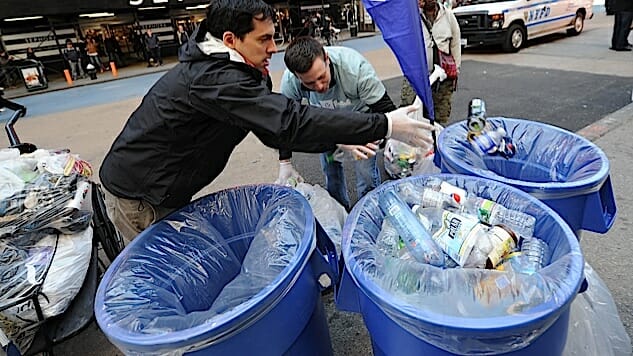We Can’t Stop the Climate Change Apocalypse Through Individual Action Alone
Photo by Jason Kempin/Getty
If you’ve glanced at a newspaper, or even looked out a window at some point over the last year or two, you may have noticed that extreme, deadly weather events seem to be happening more and more frequently throughout the world. This summer a heat wave in Quebec killed over 90 people. 200 were killed in flooding in Japan. Devastating hurricanes are ravaging coastal cities in the west, while record typhoons are battering the east. There are wildfires burning from Southern California to the arctic circle. It’s starting to look like the opening montage to an apocalyptic disaster movie out there.
If for some reason you missed all this stuff, or aren’t sure how you should fit these events into a broader context with regards to the Earth’s climate, you might be interested to hear that the heavily researched, two-years-in-the-making IPCC report on climate change was released last week, and it really helps to put everything into the proper perspective. And since it would be understandable if you hadn’t seen it, as it barely made a blip in the vapid, nightmarish vortex that is the American news cycle, here’s a little summation for you: things are looking pretty grim!
It turns out we’ve only got about a decade and change left to avert the absolute worst case climate scenario of two degrees global warming, which is going to drown coastlines all across the planet, displacing millions of people (mainly the developing world’s poorest citizens), creating a crisis that will make the worldwide refugee situation in 2018 look like a mild conflict in comparison, and give rise to even more cruel, xenophobic far right authoritarian governments. And that’s without taking into account the crop failures, famines, water shortages, mass extinctions, and other horrors that the coming generations are almost certainly going to be dealing with.
Obviously, this is very scary stuff. But it’s important not to panic. All is not lost. Some of the news organizations that have bothered to cover this have offered up some helpful tips on things we can do as individuals to possibly make an impact and do our part to turn the tide, so to speak.
Scared by that new report on climate change? Here’s what you can do to help:
• Eat less meat (about 30%)
• Swap your car or plane ride for a bus or train
• Use a smart thermostat in your home, and upgrade to more efficient appliances
More: https://t.co/m6JnG7mUsxpic.twitter.com/82rssjms0i
— CNN (@CNN) October 9, 2018
Now, it is absolutely true that ditching your gas-powered car in favor of public transportation, cutting out factory-farmed meat, switching to more energy-efficient light bulbs, or smashing your air conditioning unit with a sledgehammer would limit your personal carbon footprint. That’s good! We should be doing these things (though it’s probably a good idea to hang on to that AC). But it’s important that we also recognize that changing our individual consumption patterns is more about achieving a form of personal catharsis or an act of self-care than something that’s actually going to make an iota of difference in averting the horrifying future we’re currently faced with.
That’s because any conversation about what we can do to slow down or stop the devastating effects of climate change has to begin with an understanding of exactly what that means: dismantling the broken economic system that has led us to this point, and the institutions whose very existence are based on this very system growing exponentially until it consumes us all. Whether you spend the remainder of your life eating factory farmed steaks and spraying aerosol cans into the ozone layer for 40 hours a week, or you drive your car into the ocean and only survive on locally sourced greens and nuts, we must all confront a very stark reality. Otherwise, personal sacrifice won’t make any difference.
Because no matter how much you as an individual do or do not consume, or how relatively big or small your carbon footprint is, it doesn’t change the very simple arithmetic that only 100 companies are responsible for 71% of global emissions. That the United States military is one of the world’s biggest polluters. That the entirety of what we think of as modern civilization is based on an increasingly chaotic death spiral of fossil fuel addiction. Yes, solving this problem will require a massive scaling back of many of the comforts that we have spent entire lives enjoying. But this has to be a collective, not individual, effort—the likes of which has not been attempted in the entirety of human history.
We also need to clearly understand that there is an entrenched political and media class that is not only declining to even attempt to solve this problem in any meaningful way, but doing everything they can to make it worse. The Trump Administration made leaving the “very unfair” Paris Agreement a centerpiece of their first two years (and is being closely followed by Jair Bolsonaro, the fascist about to take over the Brazilian government). Recent changes to US auto emission standards essentially add up to an admission that global climate change is indeed happening, but it’s just so hopeless that taking steps to reduce emissions (and thus, energy industry profits) are so inadequate so to not even be worth doing.
In Canada and Australia, conservative parties backed by the energy industry are arguing against even instituting a carbon tax, a market-based solution that, though a half measure, has been proven to help decrease carbon emissions. This is all backed up by a massive conservative media machine that is deliberately lying to their audiences to provide cover for their partners in the business sector and the politicians carrying out their preferred policies.
This all means that in the coming years, we must prioritize climate justice, ideally in the form of punitive measures towards the energy executives, politicians and media figures who knowingly deceived people about the terrifying seriousness of this problem until it was, barring an unprecedented miracle, too late. No, making sure these people are held to some kind of account isn’t going to decrease the warming of the planet, but it will send a message that this kind of behavior won’t be tolerated any further as we set about the very difficult work of undoing the damage that has been done.
Though they seem to be at least demonstrating an understanding of the seriousness of the issue and are taking large steps to address it, the Communist Party of China is responsible for the majority of global carbon emissions, so it’s not simply about dismantling capitalism (though that would be a start). It’s about radically rethinking and reorganizing our society and drastically restructuring our priorities and values. It’s about recognizing that the billions of people that are going to be adversely affected by climate change in the coming decades are much stronger and more powerful than the relatively few elite figures who are insisting that we continue to ride the free market directly off the cliff.
It’s a monumental task, but if we continue approaching it as something that can be addressed through individual actions, we might as well just begin preparing for our inevitable future in Beyond Thunderdome.







































